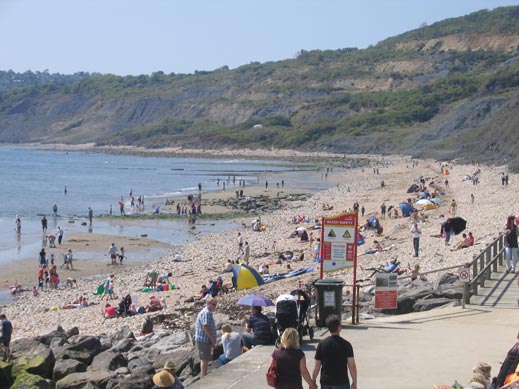The UNESCO World Heritage Site of the Jurassic Coast is a fantastic place for fossil hunting. However, safety must come first when exploring this beautiful coastline. Charmouth and Lyme Regis are popular locations, but we advise that visitors follow these top tips for safe fossil hunting.
-
Stay away from the base of cliffs.
Rock falls and landslides are frequent occurrences, especially after dry or wet weather. Keep a safe distance from the cliff face.
- Check tide times before you go.
Getting trapped by a rising tide is a real risk. Plan your fossil hunting around a falling tide and always leave yourself plenty of time to return safely.
- Stick to marked paths and access points.
Use designated paths to reach the beach. Avoid scrambling over rocks or climbing cliffs.
- Wear suitable clothing and footwear.
Sturdy, waterproof boots with a good grip are essential. Bring layers and rain gear as the weather can change quickly along the Dorset coast.
- Do not use hammers or dig into the cliffs
Using tools can damage fossils and is unsafe on unstable rock. Look along the beach instead as fossils are regularly washed out of the cliffs.
- Join an organised fossil walk with a local expert.
A person with local expertise can take you safely out along the shoreline. Their local knowledge will help you find fossils and they can identify fossil discoveries for you.
For information on Lyme Regis and Charmouth fossil walks: Lyme Regis Fossil Walks.

The beaches around Lyme Regis and Charmouth attract lots of visitors, but sensible precautions are required to keep everyone safe. Photograph taken in 2009. Picture credit: Everything Dinosaur.
Picture credit: Everything Dinosaur
Safe Fossil Hunting
Recent dry weather has caused the cliffs to dry and crack. This makes them unstable and increases the risk of landslides and rock falls. Landslides and rock falls can happen suddenly, even without warning.
Mike from Everything Dinosaur urges caution.
“The cliffs may look permanent, but appearances can be deceptive. Please stay away from the base of the cliffs. Look for fossils on the shore, there is no need to venture close to the cliffs.”
Mike also advised visitors to check tide times. In addition, he stated that the best way to enjoy safe fossil hunting is to stay alert, be sensible and plan ahead. Furthermore, rocks can be slippery, so wear sensible, appropriate footwear. Also, bring a mobile phone and let someone know where you are going and when you expect to return.
Finally, be respectful, and take your litter home. Fossil hunting should be fun and a memorable experience for all.
The Everything Dinosaur website: Prehistoric Animal Models.


These are some very salient points Mike. Beware of the dangerous cliffs that are liable to fall suddenly and without warning ‼️ It’s a good point in time just before the school Summer holidays arrive to warn people about the dangers of the Jurassic Coast! Thanks very much for the mention cheers 👋 There is a fossil collecting code of conduct in operation along the Jurassic Coast! You can see that online, look up “West Dorset Fossil Collecting code of conduct .” You can save little fossils like iron pyrite ammonites from the destruction of the sea at low tide. You must not dig in the cliffs in situ, beware of the dangerous cliffs these are liable to fall suddenly and without warning !! You must register key scientifically important fossils at the Charmouth Heritage Centre, where the scientific community are able to study your finds for a period of six months, to further the cause of science. A lot of amateurs and professional fossil hunters have made finds along the Jurassic Coast at low tide, that have ended up as valuable museum assets. Many incredible fossil specimens and “one offs” have been recovered, recorded and donated by a combination of dedicated locals and visitors from these locations.
There some salient points here Mike. It’s a great time to mention the safety issues along the Jurassic Coast- just before the school holidays. It’s a good reminder that the cliffs are dangerous and liable to fall suddenly and without warning ‼️ Stay away from the dangerous cliffs! There is a fossil collecting code of conduct in operation along the Jurassic Coast! You can see that online, look up “West Dorset Fossil Collecting code of conduct .” You can save little fossils like belemnites from the destruction of the sea at low tide. You must not dig in the cliffs in situ, beware of the dangerous cliffs these are liable to fall suddenly and without warning !! You must register key scientifically important fossils at the Charmouth Heritage Centre, where the scientific community are able to study your finds for a period of six months, to further the cause of science. A lot of amateurs and professional fossil hunters have made finds along the Jurassic Coast at low tide, that have ended up as valuable museum assets. Many incredible fossil specimens and “one offs” have been recovered, recorded and donated by a combination of dedicated locals and visitors to these locations.